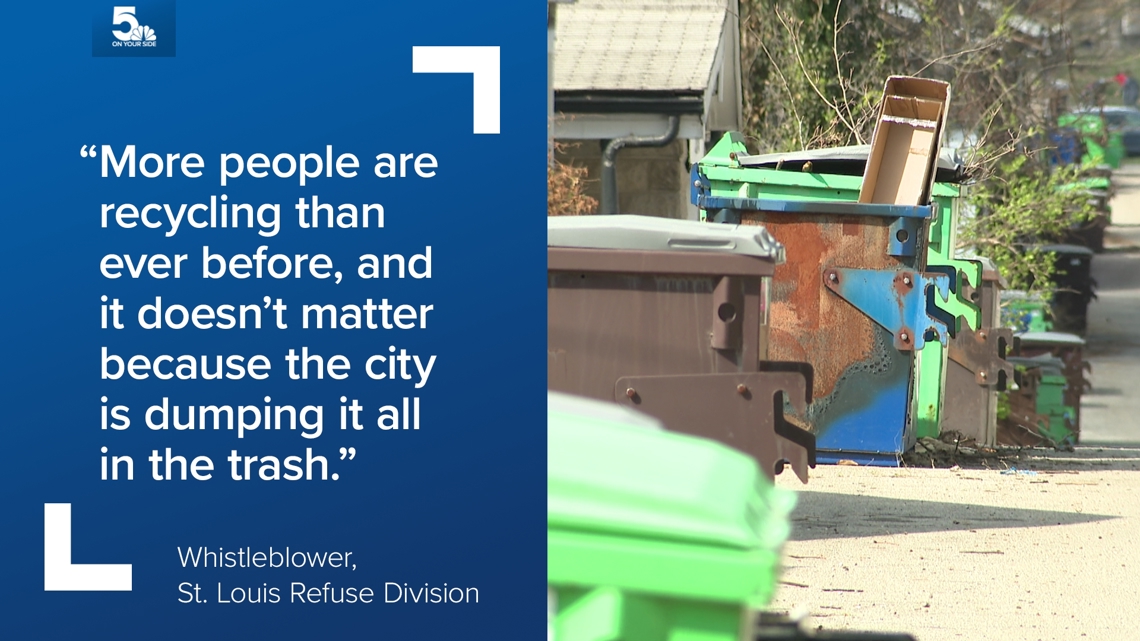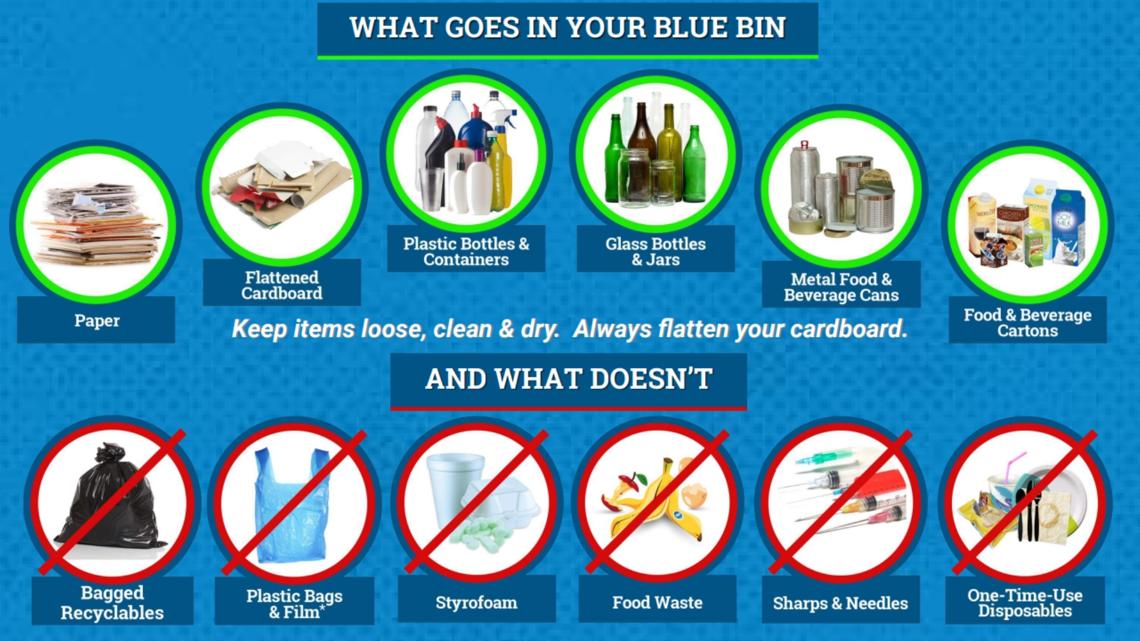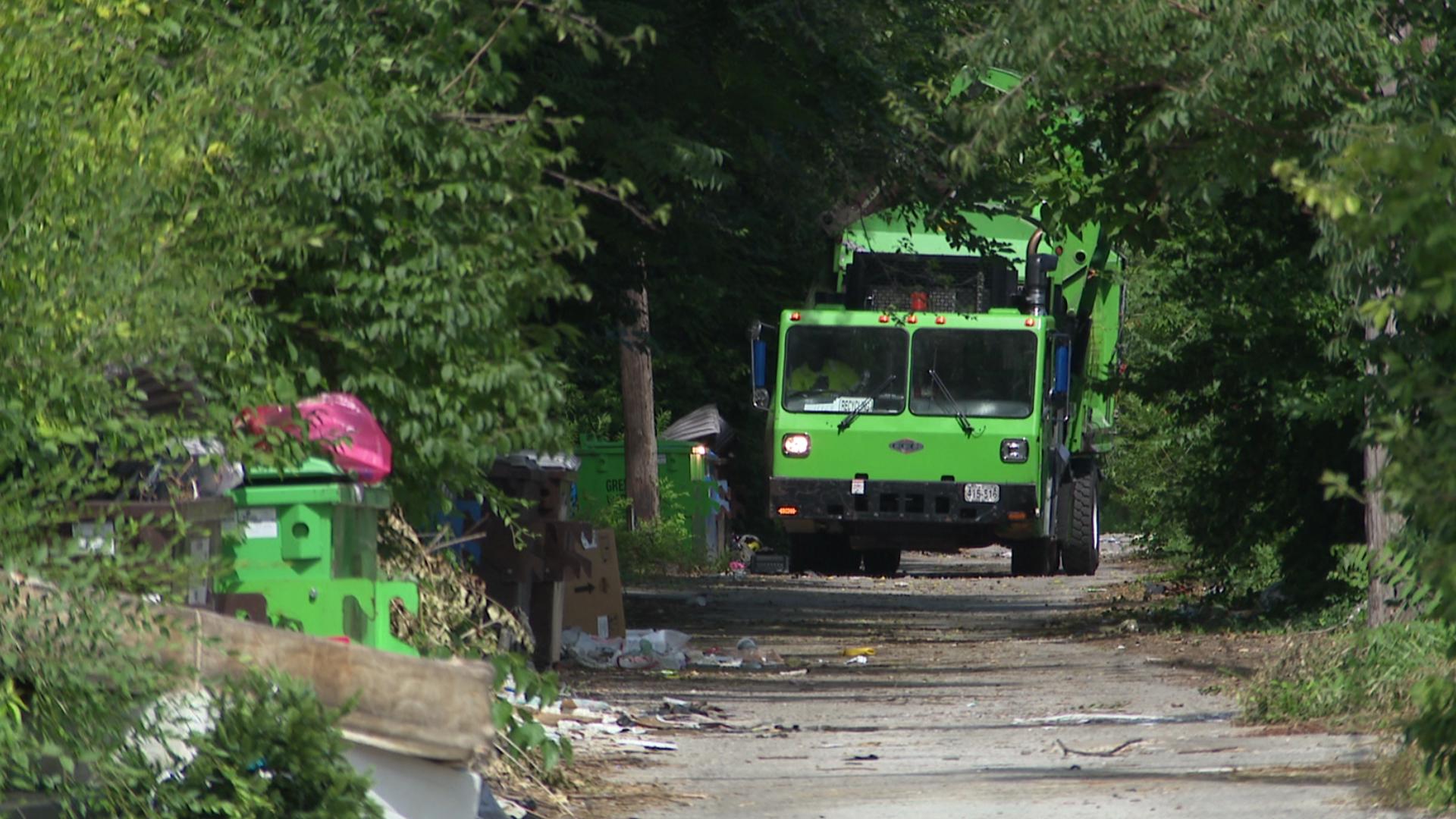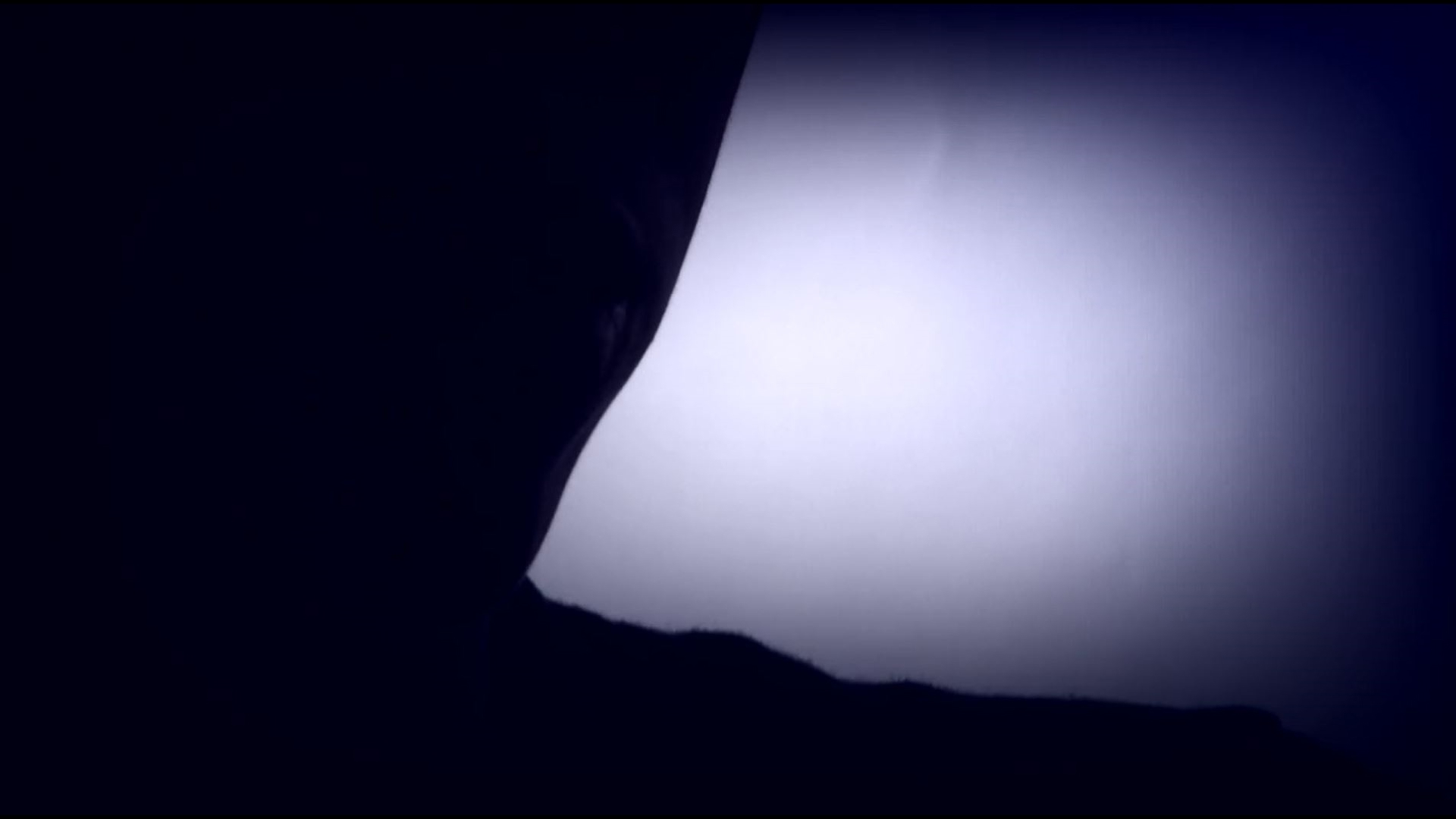ST. LOUIS — In a months-long investigation, the I-Team has delved into recycling practices in St. Louis. Drivers told us the city is cutting corners.
“I want the citizens to know what's going on in their neighborhood," a St. Louis City recycling truck driver said. “Something isn't right."
The I-Team spoke with three people who work in refuse, or trash collection, with the city who wanted to remain anonymous, fearing speaking out publicly would cost them their jobs. In on-camera interviews with one of those whistleblowers, the I-Team concealed their face and altered their voice to help protect their identity.
“The city has us mixing recycling and trash, and yard waste all together at times," the city recycling truck driver, noting that they believe it happens in about half of the city. “They assume that certain neighborhoods don't recycle,"
Viewers have been sending in video evidence, and the I-Team witnessed it themselves.
“And this is done on a daily basis, mainly done on North Side routes," the driver said.
City of St. Louis residents pay $14 a month for refuse services, which includes recycling, per household. The city does not currently have a breakdown available of specifically recycling spending.
Recycling concerns
The three people who work with the city refuse division said the mixing of trash and recycling occurs mainly in lower-income areas of north St. Louis, in neighborhoods such as Hamilton Heights, Wells-Goodfellow, and Baden. They said it also happens in select South St. Louis neighborhoods, including Marine Villa, Dutchtown and Shaw.
In neighborhoods like Dogtown, Jamieson, Central West End, Tower Grove and other areas in south St. Louis, recycling is picked up separately from trash, they said.
Drivers said items that contaminate recycling bins are things like water and plastic bags.
The city employs four workers to inspect alley recycling bins before collection. If bins contain too many incorrect items, city officials said they’re labeled "contaminated." These workers then instruct drivers to dispose of recycling as trash.
In a March interview, the City of St. Louis’ Refuse Commissioner Randy Breitenfeld told the I-Team the city has four foremen who are tasked with inspecting the city’s alley recycling bins. They tell drivers when to combine trash and recycling. Breitenfeld said drivers do not have permission to look inside bins.
But the whistleblower said those workers are often not looking inside alley recycling bins to check for contamination and are instead making assumptions about certain areas of the city.
“How often are you dumping clean recycling into your truck?" Senior Investigative Reporter Paula Vasan asked.
“Every time I go to work," the driver said. “We will still get written up if we do not follow instructions that we were given the morning when we get our route.”
“So you're just following directions?" Vasan asked.
“Yes," the driver said.
Drivers call recycling a flawed process
The I-Team requested documents from the city showing the recycling process. The request filed in April remains unanswered. But through sources, we obtained internal records. Drivers showed us their instructions to “mix” recycling and trash along an entire route. They said Route 40, for example, has around 75 alley recycling bins. Others have more.
“I don't like it, and I believe that it needs to stop. Routes should be done the way they're supposed to be done," the driver said.
Instead of driving down routes twice to pick up both recycling and trash separately, this driver said they’re instructed to go down them once and combine everything.


With cameras inside some trucks showing what’s dumped inside, one of the whistleblowers we spoke with and one we interviewed on camera told us up to about 65% of what they collect daily is recycling done correctly. But it goes into a landfill.
“So they're saving money by treating everything as trash," the driver said.
This practice, according to three sources who work in trash collection, has been ongoing for about a year.
“Do you think the problem is getting worse?” Vasan asked another whistleblower who works with the city's refuse division.
“Yes, it’s getting worse because you’ve got several blocks that will recycle, you get other blocks that don't, and the city mixes it all together anyway,” they said. “Because the recycling is picking up, you got more people recycling now. More people are recycling than ever before, and it doesn't matter because the city is dumping it all in the trash... It’s not fair to the people that are just trying to recycle. Okay, you got people that are really trying to do the right thing for the environment, and it's not fair to them to take their time and recycle and the city comes behind them and dumps it all with the trash."
The city's response
People who work in the city’s refuse division said there are thousands of alley recycling bins citywide.
Robert Atchisson, a spokesperson with the City of St. Louis Street Department, told the I-Team there are about 125 trash and recycle routes consisting of 55 routes collected twice weekly on Monday and Thursday, 55 routes collected twice weekly on Tuesday and Friday and 15 routes collected on Wednesdays as well as any others that may have been missed due to holidays or weather-related circumstances.
Atchisson said the city currently employs 57 drivers to drive city trash and recycling trucks out of an allowed 82. That means the city is short by about 25 trash and recycling drivers based on positions available.
In an email, he said: “...There are foremen tasked with judging the condition of recycling bins. If they find them to be contaminated, then those bins are collected with solid waste. Recyclables are easily contaminated so this inspection is a vital part of the process to ensure that other recyclables are not likewise affected and the tainted material may be properly disposed of.”
Atchisson said the city’s challenges with recycling reflect both the difficulties and importance of a citywide effort to properly dispose of certain materials.
“Groups like Saint Louis City Recycles are invaluable resources in their efforts to help educate and remind the public of best practices and correct steps to follow,” he said.
We asked the city how many alley recycling bins are in the city. Atchisson said, “There are no current numbers, as we are in the process of a new study to determine those very items.”
He could not tell us when that study would be completed or provide an estimate or range.
The city was not available for an interview since drivers have come forward.
In an interview with the I-Team earlier this year, City of St. Louis’ Refuse Commissioner Randy Breitenfeld said the city is forced to not recycle in areas where it’s done especially poorly. Items like plastic bags, food waste and even water can contaminate entire truckloads. And the city does not want to pay for recycling if it eventually goes to a landfill.
“It doesn't take a lot to contaminate a load," Breitenfeld said.


There are other obstacles, too.
“How is the lack of drivers impacting the city's ability to recycle?” Vasan asked.
“That doesn't have anything to do with it. It's just that we might not get to your route as scheduled like we used to," Breitenfeld said.
But drivers tell the I-Team it’s having a big impact.
“The citizens are paying for a service that they're not receiving," the whistleblower said.
Citywide recycling challenges
Drivers tell us the city does not have enough drivers each day to handle all of the city’s routes, with low pay being one of several factors they said makes it hard for the city to attract more people. A city trash truck driver starts with an annual base salary of $44,000, with retention increases after five, 10 and 15 years of service.
City of St. Louis’ Refuse Commissioner Randy Breitenfeld told the I-Team in March that before July 2023, when the city used Waste Management as a vendor, 60% of the recycling picked up for sorting from city recycling bins in alleys was contaminated. A total of 40% of what was picked up went to Material Recovery Facilities, the final stage in the recycling process. On average about 20% of that amount was considered contaminated, with 80% being recycled.
Right now, the city uses Republic Services, an environmental services provider that includes recycling services, as its vendor. Of the amount of recycled materials that Republic Services picks up from recycling bins in the city, a spokesperson said that on average they are seeing roughly the same breakdown as the previous vendor: 80% is recycled and 20% is contaminated materials that head to the landfill.
That means that on any given day, the contents of around 3 in 10 city recycling bins in alleys actually end up recycled. City officials said the rest goes into landfills.
Breitenfeld told the I-Team in a March interview that it costs the city about four and a half times as much to recycle instead of sending contaminated recycling loads to a landfill. If there’s too much contamination in recycling bins, it’ll end up in landfill even if it gets picked up as recycling.
For now, residents are left questioning the integrity of a system they pay to support.
Meanwhile, the city has told us making sure everyone is putting the right things into the right bins will reduce contamination and increase recycling rates.
Got a tip? Email Senior Investigative Reporter Paula Vasan directly at pvasan@ksdk.com.


